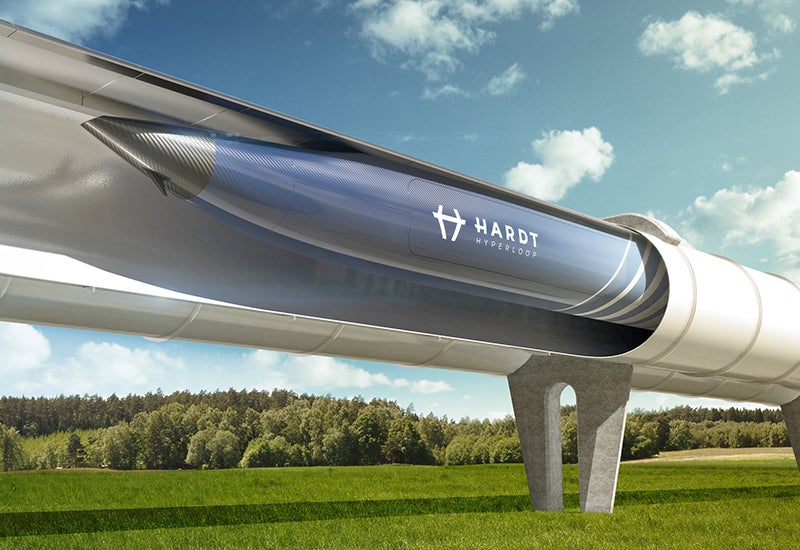
Advocates of the hyperloop train concept say it could revolutionise the railway industry with respect to technology as well as sustainability. Given that the hyperloop technology market is expected to reach a value of almost $6bn by 2026, according to Verified Market Research, it’s no secret that the number of firms attempting to launch their own hyperloop project across the globe is rising.
Virgin Hyperloop, for instance, has begun the tracklaying for the hyperloop train between Mumbai and Pune, claiming that India might be the first to witness the technology.
Another such firm, Hardt Hyperloop, aims to bring the technology to Europe. Led by Dutch engineer Tim Houter, Hardt was spawned from a team of students who won Elon Musk’s hyperloop competition in 2017.
The hyperloop works by propelling capsules through large tubes using magnets. In addition, Hardt also boasts of its lane-switching technology which would allow pods to switch from one lane to another without any additional or moving parts, like cars on a highway, it said in a statement.
The company said that the main goal is to connect all major cities in Europe with a travel time less than two hours. In addition, the train will reduce travel time from Amsterdam to Frankfurt to less than 50 minutes, compared with the four hours it currently takes, it said in a statement.
Hardt’s CEO and co-founder Tim Houter talks about how the lane-changing technology works and what lies in the future.
Varsha Saraogi (VS): How did the idea of Hardt come about?
Tim Houter (TH): My co-founders and I were originally part of a student team at Delft University focused on designing electric race cars when Elon Musk launched the Hyperloop Pod Competition back in 2017. After submitting our pod designs, we were invited to participate and we won. After the competition, it was an obvious next step to launch Hardt Hyperloop and turn our concept into a reality.
VS: How do you aim to compete with companies like Virgin which are also launching a hyperloop project?
TH: At this stage of development, we do not see other hyperloop initiatives so much as competition, but rather we look at the common interests we have and the common goals we pursue. What makes us different from other initiatives is our ethos to build an open ecosystem. We’ve partnered with industry giants such as Deutsche Bahn, Tata Steel and InnoEnergy to access the resources that we’ll need as well as signing agreements with other initiatives to boost collaboration. We see the interest in the sector as proof that there is potential in the hyperloop market.
VS: What innovations are you in the process of introducing through the project?
TH: [In 2019] we celebrated the official opening of Europe’s first full-scale hyperloop test facility in the presence of the European Commissioner for Transport Violeta Bulc and the Dutch Minister for Infrastructure and Water Management Cora van Nieuwenhuizen.
As part of our tests, we announced the realisation of our break-through Hyperloop Lane Switch technology. The technology will allow vehicles to change from one lane to another without additional or moving components. Vehicles will be able to retain their high speeds, effortlessly switch routes, and merge in and out of the network. This technology is crucial for the realisation of hyperloop worldwide and Hardt Hyperloop is the only one to have it.
The next phase of our development is to establish the European Hyperloop Center which will house a 3km test track. The track will be used to test hyperloop technology at more than 700 km/h as well as providing the basis for the standardisation of European hyperloop infrastructure and technology.
VS: When is the project due to launch?
TH: We plan to have the European Hyperloop Center realised by 2022 and a 10 to 15km pilot route built by 2023. Our more ambitious aim is to begin operating commercial lines by 2028.


